


The discussion on the National Education Policy (NEP) 2020 with school management and teachers of practice teaching schools by the Institute of Language Teaching (ILT) is a proactive and community-oriented outreach activity that demonstrates a commitment to educational reform and community engagement.
NEP 2020 is a transformative policy that envisions a paradigm shift in the Indian education system. By initiating a dialogue with school management and teachers from practice teaching schools, ILT underscores its dedication to disseminating information and fostering a collaborative understanding of the policy’s implications.
This outreach activity provides a platform for stakeholders to engage in meaningful discussions, share insights, and address any queries or concerns related to NEP 2020. The exchange of ideas during such discussions can lead to a more nuanced understanding of the policy’s goals and the practical implications for schools.
Involving school management and teachers in the discussion aligns with the collaborative nature of educational initiatives. It creates a space for collective decision-making and encourages a sense of ownership and responsibility among educators, ensuring that the NEP implementation is a shared endeavor.
Furthermore, this activity contributes to the professional development of teachers by keeping them informed about the latest developments in education policy. It also fosters a sense of community among schools, promoting a network where knowledge and best practices can be shared, ultimately enhancing the overall quality of education in the community.
In essence, the NEP 2020 discussion serves as a bridge between academic institutions like ILT and the broader community, creating an environment where educational stakeholders actively participate in shaping the future of education in line with national policy reforms. The ripple effect of such community activities can lead to more informed and empowered educational communities.